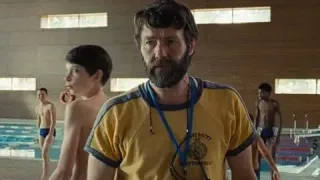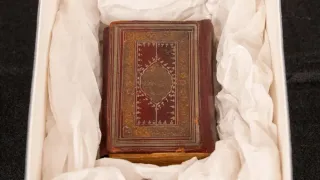April 4, 2023
'Merrily We Roll Along' – A Rewinding Sondheim Revival at 42nd St. Moon
Jim Gladstone READ TIME: 5 MIN.
In the wake of Stephen Sondheim's death 18 months ago, a rewarding wave of retrospection has surged. There have been numerous cabaret and concert tributes, regional and community theater revivals, and acclaimed New York revivals of both two Sondheim masterpieces – "Into the Woods" (coming to San Francisco this summer, with much of its cast intact) and "Sweeney Todd"– and two less universally adored works from his oeuvre, "Company" and "Merrily We Roll Along."
An enjoyable production of the latter, now being staged by 42nd Street Moon, is well worth catching in one of its final five performances before closing after Sunday's Easter matinee. The show offers some of Sondheim's most melodic tunes – "Not A Day Goes By," "Old Friends," "Our Time"– compellingly sung by a strong central cast and an odd story structure that may strike first-time viewers as niftily meta-fangled but, in fact, dates back to the musical's source material, the 1934 Kaufman and Hart play of the same name.
Sondheim, a famous lover of cryptograms and other puzzles, is often noted for the ingenious complexity of his songwriting. But he's also drawn to complex narrative approaches. "Company" explodes a group snapshot into smaller individual portraits; "Sunday In The Park with George" fast forwards by generations between acts; "Into The Woods," interweaves the previously distinct plots of several Brothers Grimm tales; "Follies" simultaneously plays out its characters' past and present.
So one can see the tricksy allure that Kaufman and Hart's play must have had for him. The play follows its showbiz characters in reverse chronology; a not-so-merry rewind from regretful middle-age to bright-eyed lost youth. While George Furth is the credited book writer, Sondheim has been recognized as not just the musical's composer, but its primary architect.
We meet the former songwriting team of Franklin Shephard (Will Giammona) and Charley Kringas (DC Scarpelli) in 1976. Frank is surrounded by sycophants at a premiere party for his latest formulaic money-making movie, where he announces the end of his second marriage and cold-shoulders his old friends Charley (whose recent Pulitzer-winning play is of little concern amidst the lucre of L.A.) and Mary (Melissa Wolfklain), their steadfast gal pal whose decades of unrequited swooning for Frank have led to crabbiness with a side of alcoholism. (It's a thankless role; reflective of, but not insightful about, the story's time period.)
This afterthought approach to women's inner lives continues to sting through the final scene, set in 1957. It includes the meet-cutes not only of Frank and Mary (she's heard his piano playing through their apartment building's walls at all hours... and she adoooores it), but also of Charley and his soon-to-be wife, Evelyn, who hasn't appeared in a single other scene for the rest of the show.
And yet, marvelously, this production's two most indelibly-etched characters are Beth (Juliana Lustenader) and Gussie (Christine Capsuto-Shulman), Charley's first and second wives. The fact that this is the only way to clearly describe their roles underscores the lack of agency written into their characters. In their singing, though, these actresses dig deep, bringing sharp definition to fuzzily written roles.
Lustenader, a pellucid vocalist who brought similarly stirring emotion to recent local productions of "Violet" and Sondheim's "Passion," perfectly shifts tone across her two renditions of "Not A Day Goes By," one imbued with embitterment, the other brimming with optimism.
Capsuto-Shulman evinces Gussie's consistently steely sense of self-worth even as she transistions from strategic seductress to scorned spouse. There's little scenery in Kuo-Hao Lo's minimalist set design, but what there is gets gloriously chewed in Capsuto-Shulman's Lainie Kazan-cum-Fran Drescher delivery of "Growing Up" and Act II's show-within-the-show "Opening" song.
Also making the most of a featured role is Chris Reber as Joe, a Broadway producer and Gussie's first husband. His brusque, Runyon-esque presence brings welcome grit to every scene he's in.
Giammona's Frank and Scarpelli's Charley feel less specific than the female leads, in part because the their story is hamstrung by a connect-the-dots simplicity that feels requisite to its finish-to-start telling. Once the audience is required to follow the plot backwards, complicating things further risks incomprehensibility. So Frank reads as a wunderkind-turned commercial sellout-turned boor; Charlie as a morally honorable artiste, uncompromising in his earnestness.
Still, the songwriting here is sheer, clever pleasure and the cast delivers it deliciously. There are Easter eggs aplenty for musical theater buffs in the lyrics, including a lyric referencing "Funny Girl," "Fiddler" and "Dolly," and Sondheim's knowing jokes about producers unreasonably demanding "more hummable" songs – delivered one of his most hummable scores.
The backward structure also allows for a bit of flashy musical puzzle-making. The first version of many songs performed is a short version or just a snippet, functioning as a reprise might in a more conventional show. When the song is later reprised, it's in the fuller iteration that would normally come first.
Finally, and befitting the Easter season, praise is due for the decades of fashion smartly paraded across the stage by costume designer Brooke Jennings. The robin's egg blue outfit worn by Beth in Act I is at once period-perfect and drop-dead gorgeous, and the array of clothing on display in several large party scenes makes you wish you'd been invited.
'Merrily We Roll Along,' through April 9. $35-$78. 42nd Street Moon at the Gateway Theater. (415) 255-8207 www.42ndstmoon.org
Help keep the Bay Area Reporter going in these tough times. To support local, independent, LGBTQ journalism, consider becoming a BAR member.






